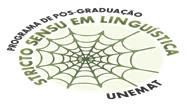Banca de QUALIFICAÇÃO: EDNEIA REGENIR DA SILVA CONCEIÇÃO
Uma banca de QUALIFICAÇÃO de DOUTORADO foi cadastrada pelo programa.DISCENTE : EDNEIA REGENIR DA SILVA CONCEIÇÃO
DATA : 30/06/2025
HORA: 14:30
LOCAL: Videoconferência
TÍTULO:
A SEMANTIC-ENUNCIATIVE STUDY OF THE LINGUISTIC FORM “STAY AT HOME” IN ENUNCIATIVE SCENES OF THE PANDEMIC
PALAVRAS-CHAVES:
Event, Enunciative Scene, Stay at Home, Brazil cannot stop, Movement of Senses.
PÁGINAS: 60
GRANDE ÁREA: Lingüística, Letras e Artes
ÁREA: Lingüística
RESUMO:
This thesis, linked to the Stricto Sensu Postgraduate Program in Linguistics at the State University of Mato Grosso, in the area of concentration of Studies of Linguistic Processes, inserted in the research line “Study of Processes of Significance”, aims to analyze the meanings produced in the enunciative scenes of banners and statements that refer to the Covid19 pandemic, which constitute the linguistic form “Stay at Home”. At first, we took as a unit of analysis the statements of the banners that were implemented in the city of Cáceres-MT, by initiative of the city hall and health department, during the pandemic period, and later, we cut out as a language event, the enunciative scene that refers to the #OBrasilNaoPodeParar Program, launched by the federal government, in the same space/time, in opposition to the isolation guidelines made by health institutions. We conducted this study from the perspective of Historical Semantics of Enunciation or Semantics of the event, based on the studies updated by Eduardo Guimarães (1995/2018) and Luís Francisco Dias (1995/2012), paying close attention to the process of signification that permeates the statements and that function in an imperative manner, requesting isolation or not. Methodologically, we selected four photographs of the banners installed in Cáceres, and which present the linguistic form “Stay at home”, in contrast, a clipping from the #OBrasilNãoPodeParar campaign, and the comments produced on social networks regarding this campaign. These enunciative events were taken as language material for investigation, in the search to infer the movement of meanings in the selected enunciative scenes, as a study of processes of signification, because we believe that saying, as the product of an act of enunciation, always brings about a different and new event, which gives existence to the subject in the functioning of language.
MEMBROS DA BANCA:
Presidente - 592.690.301-72 - ROSIMAR REGINA RODRIGUES DE OLIVEIRA - UNIFESSPA
Interna - 257078027 - FRANCINELI CEZARINA LARA
Interno - 313839002 - LUCAS AUGUSTO SOUZA PINTO ALVARES
Interno - 37199002 - TAISIR MAHMUDO KARIM
Externa à Instituição - Debora Raquel Hettwer Massmann - UFAL
Externo à Instituição - 842.897.837-91 - MARLON LEAL RODRIGUES - UEMS



